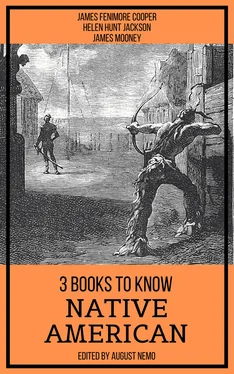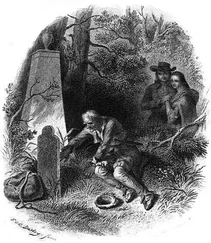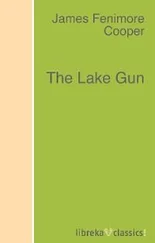But all this diligence and speed were not without an object. After crossing a low vale, through which a gushing brook meandered, he suddenly ascended a hill, so steep and difficult of ascent, that the sisters were compelled to alight, in order to follow. When the summit was gained, they found themselves on a level spot, but thinly covered with trees, under one of which Magua had thrown his dark form, as if willing and ready to seek that rest which was so much needed by the whole party.
––––––––
“Cursed by my tribe
If I forgive him.”
Shylock.
––––––––

The Indian had selected, for this desirable purpose, one of those steep, pyramidal hills, which bear a strong resemblance to artificial mounds, and which so frequently occur in the valleys of America. The one in question was high and precipitous; its top flattened, as usual; but with one of its sides more than ordinarily irregular. It possessed no other apparent advantage for a resting-place than in its elevation and form, which might render defence easy, and surprise nearly impossible. As Heyward, however, no longer expected that rescue which time and distance now rendered so improbable, he regarded these little peculiarities with an eye devoid of interest, devoting himself entirely to the comfort and condolence of his feebler companions. The Narragansetts were suffered to browse on the branches of the trees and shrubs that were thinly scattered over the summit of the hill, while the remains of their provisions were spread under the shade of a beech, that stretched its horizontal limbs like a canopy above them.
Notwithstanding the swiftness of their flight, one of the Indians had found an opportunity to strike a straggling fawn with an arrow, and had borne the more preferable fragments of the victim patiently on his shoulders, to the stopping-place. Without any aid from the science of cookery, he was immediately employed, in common with his fellows, in gorging himself with this digestible sustenance. Magua alone sat apart, without participation in the revolting meal, and apparently buried in the deepest thought.
This abstinence, so remarkable in an Indian, when he possessed the means of satisfying hunger, at length attracted the notice of Heyward. The young man willingly believed that the Huron deliberated on the most eligible manner of eluding the vigilance of his associates. With a view to assist his plans, by any suggestion of his own, and to strengthen the temptation, he left the beech, and straggled as if without an object, to the spot where Le Renard was seated.
“Has not Magua kept the sun in his face long enough to escape all danger from the Canadians?” he asked, as though no longer doubtful of the good intelligence established between them; “and will not the chief of William Henry be better pleased to see his daughters before another night may have hardened his heart to their loss, to make him less liberal in his reward?”
“Do the pale-faces love their children less in the morning than at night?” asked the Indian, coldly.
“By no means,” returned Heyward, anxious to recall his error, if he had made one; “the white man may, and does often, forget the burial-place of his fathers; he sometimes ceases to remember those he should love and has promised to cherish; but the affection of a parent for his child is never permitted to die.”
“And is the heart of the white-headed chief soft, and will he think of the babes that his squaws have given him? He is hard to his warriors, and his eyes are made of stone!”
“He is severe to the idle and wicked, but to the sober and deserving he is a leader, but just and humane. I have known many fond and tender parents, but never have I seen a man whose heart was softer towards his child. You have seen the gray-head in front of his warriors, Magua; but I have seen his eyes swimming in water, when he spoke of those children who are now in your power!”
Heyward paused, for he knew not how to construe the remarkable expression that gleamed across the swarthy features of the attentive Indian. At first it seemed as if the remembrance of the promised reward grew vivid in his mind, while he listened to the sources of parental feeling which were to assure its possession; but as Duncan proceeded, the expression of joy became so fiercely malignant, that it was impossible not to apprehend it proceeded from some passion more sinister than avarice.
“Go,” said the Huron, suppressing the alarming exhibition in an instant, in a death-like calmness of countenance; “go to the dark-haired daughter, and say, Magua waits to speak. The father will remember what the child promises.”
Duncan, who interpreted this speech to express a wish for some additional pledge that the promised gifts should not be withheld, slowly and reluctantly repaired to the place where the sisters were now resting from their fatigue, to communicate its purport to Cora.
“You understand the nature of an Indian’s wishes,” he concluded, as he led her towards the place where she was expected, “and must be prodigal of your offers of powder and blankets. Ardent spirits are, however, the most prized by such as he; nor would it be amiss to add some boon from your own hand, with that grace you so well know how to practise. Remember, Cora, that on your presence of mind and ingenuity even your life, as well as that of Alice, may in some measure depend.”
“Heyward, and yours!”
“Mine is of little moment; it is already sold to my king, and is a prize to be seized by any enemy who may possess the power. I have no father to expect me, and but few friends to lament a fate which I have courted with the insatiable longings of youth after distinction. But hush! we approach the Indian. Magua, the lady with whom you wish to speak is here.”
The Indian rose slowly from his seat, and stood for near a minute silent and motionless. He then signed with his hand for Heyward to retire, saying coldly —
“When the Huron talks to the women, his tribe shut their ears.”
Duncan, still lingering, as if refusing to comply, Cora said, with a calm smile —
“You hear, Heyward, and delicacy at least should urge you to retire. Go to Alice, and comfort her with our reviving prospects.”
She waited until he had departed, and then turning to the native, with the dignity of her sex in her voice and manner, she added, “What would Le Renard say to the daughter of Munro?”
“Listen,” said the Indian, laying his hand firmly upon her arm, as if willing to draw her utmost attention to his words; a movement that Cora as firmly but quietly repulsed, by extricating the limb from his grasp: “Magua was born a chief and a warrior among the red Hurons of the lakes; he saw the suns of twenty summers make the snows of twenty winters run off in the streams, before he saw a pale-face; and he was happy! Then his Canada fathers came into the woods, and taught him to drink the fire-water, and he became a rascal. The Hurons drove him from the graves of his fathers, as they would chase the hunted buffalo. He ran down the shores of the lakes, and followed their outlet to the ‘city of cannon.’ There he hunted and fished, till the people chased him again through the woods into the arms of his enemies. The chief, who was born a Huron, was at last a warrior among the Mohawks!”
“Something like this I had heard before,” said Cora, observing that he paused to suppress those passions which began to burn with too bright a flame, as he recalled the recollection of his supposed injuries.
“Was it the fault of Le Renard that his head was not made of rock? Who gave him the fire-water? who made him a villain? ’Twas the pale-faces, the people of your own color.”
Читать дальше













